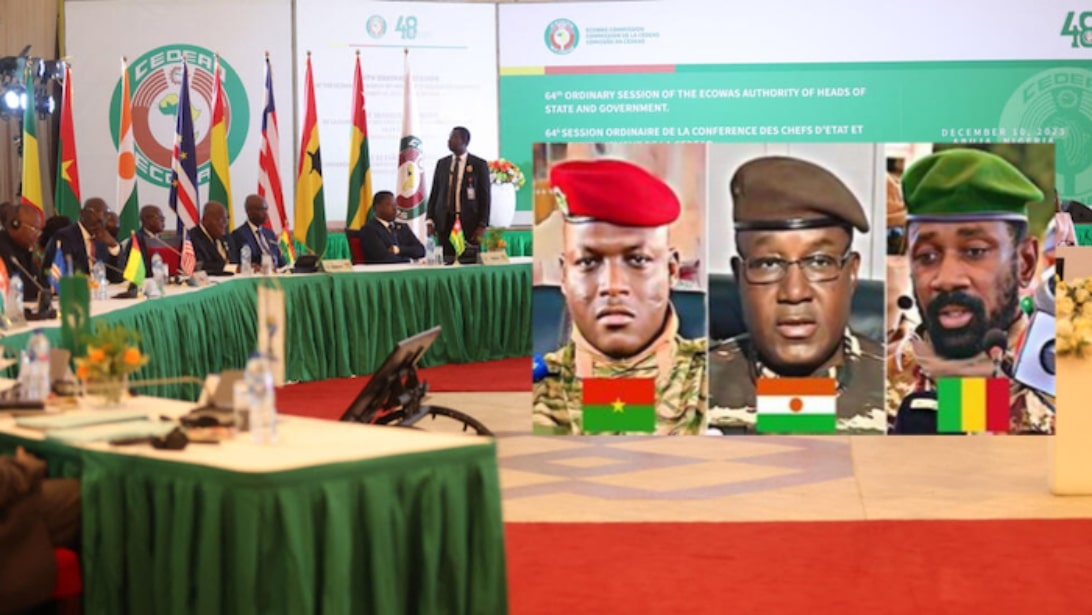On January 28, 2024, Mali, Niger, and Burkina Faso sent shockwaves through West Africa by announcing their withdrawal from ECOWAS.
This decision, a culmination of simmering tensions and divergent viewpoints, has thrown the future of regional cooperation into uncertainty.
Unravelling this decision involves exploring ECOWAS's history, the grievances of withdrawing nations, and potential consequences in the intricate geopolitical landscape.
ECOWAS: A Dream of Unity, Tested by Reality
Established in 1975, ECOWAS aimed to create a unified economic bloc promoting integration, free trade, and peace across West Africa.
Initially, it enjoyed successes, fostering collaborative development projects and facilitating regional trade.
However, cracks began appearing in recent years, revealing underlying fault lines of political divergence, security challenges, and unequal economic benefits.
Why Mali, Burkina Faso and Niger Republic Exit ECOWAS
The recent political and security upheavals in Mali, Niger, and Burkina Faso significantly influence the decision to withdraw.
All three countries experienced military coups in the past few years, raising concerns about democratic backsliding within the region.
ECOWAS responded by imposing sanctions and pressuring them to return to civilian rule.
Withdrawing nations claim an unwarranted intrusion, deepening resentment, and questioning the organization's commitment to non-interference in internal affairs.
Further fueling frustration was the perceived ineffectiveness of the G5 Sahel, a joint counter-terrorism force of which all three countries are founding members.
The G5 Sahel, supported by ECOWAS and international partners, has struggled to contain the escalating threat of violent extremist groups.
Accusing the force of favouring external actors, Mali and Burkina Faso sought alternative security partnerships with Russia, causing sanctions from ECOWAS.
Beyond Politics: Unraveling the Socioeconomic Threads
Political and security concerns take precedence, but one cannot separate the decision to withdraw from the region's persistent socioeconomic challenges.
Poverty, unemployment, and food insecurity plague all three countries, leading to widespread disgruntlement with the perceived failure of ECOWAS to address these issues effectively.
Critics argue that the organization's emphasis on regional integration hasn't benefited ordinary citizens, eroding confidence and fostering a desire for alternatives.
Internal Dynamics and the Power Play
The decision to withdraw also bears the stamp of domestic political realities in each country.
Leaders, under internal pressures, may see this move as a means to consolidate power, presenting themselves as nationalistic defenders against external interference.
This narrative resonates with sections of the population, potentially providing additional impetus for the break with ECOWAS.
An Uncertain Future: Challenges and Potential Pathways
The withdrawal throws the future of ECOWAS and regional cooperation into disarray.
Disruptions in economic ties may hinder trade and impede development efforts.
Security concerns could escalate, with the potential for instability spilling over into neighbouring countries. However, amidst the uncertainty, there are also glimmers of hope.
Dialogue and reconciliation efforts are ongoing, with all parties acknowledging the importance of maintaining some level of engagement.
There are possibilities for a mutually beneficial renegotiation of terms within ECOWAS, addressing the concerns of the withdrawing nations while upholding the organization's core principles.
Alternatively, new regional cooperation frameworks may emerge, tailored to the specific needs of different sub-regions within West Africa.
Mail, Niger, Burkina Faso's Exit: What ECOWAS Must Know
Understanding the withdrawal of Mali, Niger, and Burkina Faso from ECOWAS demands a nuanced perspective, moving beyond simplistic narratives of defiance and separatism.
It is a story woven from threads of political discontent, security anxieties, socioeconomic grievances, and internal power dynamics.
Recognizing the complexities of this situation is crucial for navigating the path forward, both for the withdrawing nations and for the remaining members of ECOWAS.
Ultimately, the success of any future regional arrangement hinges on a renewed commitment to dialogue, inclusivity, and a genuine effort to address the concerns of all stakeholders.




















